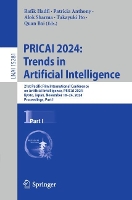|
books
| book details |
PRICAI 2024: Trends in Artificial Intelligence: 21st Pacific Rim International Conference on Artificial Intelligence, PRICAI 2024, Kyoto, Japan, November 18–24, 2024, Proceedings, Part I
Edited by Rafik Hadfi, Edited by Patricia Anthony, Edited by Alok Sharma, Edited by Takayuki Ito, Edited by Quan Bai

|
| on special |
normal price: R 2 466.95
Price: R 2 342.95
|
| book description |
The five-volume proceedings set LNAI 15281-15285, constitutes the refereed proceedings of the 21st Pacific Rim International Conference on Artificial Intelligence, PRICAI 2024, held in Kyoto, Japan, in November 18–24, 2024. The 145 full papers and 35 short papers included in this book were carefully reviewed and selected from 543 submissions. The papers are organized in the following topical sections: Part I: Machine Learning, Deep Learning Part II: Deep Learning, Federated Learning, Generative AI, Natural Language Processing, Large Language Models, Part III: Large Language Models, Computer Vision Part IV: Computer Vision, Autonomous Driving, Agents and Multiagent Systems, Knowledge Graphs, Speech Processing, Optimization Part V: Optimization, General Applications, Medical Applications, Theoretical Foundations of AI
| product details |

Normally shipped |
Publisher | Springer Nature Switzerland AG
Published date | 17 Nov 2024
Language |
Format | Paperback / softback
Pages | 489
Dimensions | 235 x 155 x 0mm (L x W x H)
Weight | 0g
ISBN | 978-9-8196-0115-8
Readership Age |
BISAC | computers / artificial intelligence
| other options |

Normally shipped |
Readership Age |
Normal Price | R 3 075.95
Price | R 2 922.95
| on special |
|